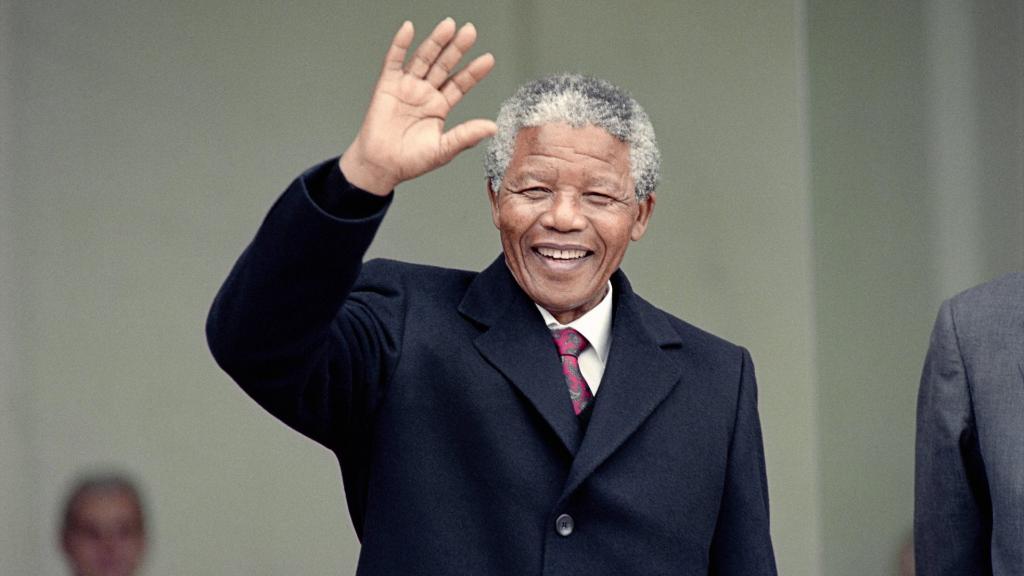Nelson Mandela biography, awarded Nobel Prize for Peace

Nelson Rolihlahla Mandela was born on 18th July 1918, (the Madiba clan in the village of Mvezo) and died in Johannesburg 5th December 2013. His father was Nkosi Mphakanyiswa Gadla Mandela, Principal, Counselor to the Acting King of the Thembu people, Jongintaba Dalindyebo. When he was 12 years old, his father died. He was a South African anti-apartheid revolutionary, political leader, and philanthropist who served as President of South Africa from 1994 to 1999. He was the country's first black head of state and the first elected in a fully representative democratic election.
Entering politics
Mandela, while slightly starting political involvement from 1942, joined the African National Congress in 1944 when he helped to form the ANC Youth League (ANCYL). Afterword he married in 1944 with Walter Sisulu’s cousin, Evelyn Mase. She was a nurse. They had two sons, Madiba Thembekile "Thembi" and Makgatho, and two daughters both called Makaziwe, the first of whom died in infancy. He and his wife divorced in 1958. Mandela rose through the ranks of the ANCYL and through its efforts; the ANC adopted a more radical mass-based policy, the Programme of Action, in 1949.
In 1952 he has been chosen as the National Volunteer-in-Chief of the Defiance Campaign with Maulvi Cachalia as his deputy. This campaign of civil disobedience against six unjust laws was a joint program between the ANC and the South African Indian Congress. He and 19 others were charged under the Suppression of Communism Act for their part in the campaign and sentenced to nine months of hard labor, suspended for two years.
A two-year of his diploma in law on basis of his BA allowed Mandela to practice in law, in 1952 he and Oliver Tambo established South Africa’s first black law firm, Mandela & Tambo.
At the end of 1952, he was banned for the first time. He was a restricted person he was only permitted to watch in secret as the Freedom Charter was adopted in Kliptown on 26 June 1955
Putting in Prison
Mandela was arrested in a countrywide police swoop in December 1956, which led to the 1956 Treason Trial. Men and women of all races found themselves in the dock in the marathon trial that only ended when the last 28 accused, including Mandela, were acquitted on 29 March 1961.
In 1964 Mandela and seven other accused, Walter Sisulu, Ahmed Kathrada, Govan Mbeki, Raymond Mhlaba, Denis Goldberg, Elias Motsoaledi, and Andrew Mlangeni, were convicted and the next day was sentenced to life imprisonment. Goldberg was sent to Pretoria Prison because he was white, while the others went to Robben Island.
Mandela’s mother died in 1968 and his eldest son, Thembi, in 1969. He was not allowed to attend their funerals.
In March 1982 Mandela was transferred to Pollsmoor Prison in Cape Town with Sisulu, Mhlaba, and Mlangeni. Kathrada joined them in October. When he returned to the prison in November 1985 after prostate surgery, Mandela was held alone. Justice Minister Kobie Coetsee visited him in the hospital. Later Mandela initiated talks about an ultimate meeting between the apartheid government and the ANC.
”I have fought against white domination, and I have fought against black domination. I have cherished the ideal of a democratic and free society in which all persons live together in harmony and with equal opportunities. It is an ideal which I hope to live for and to achieve. But if needs be, it is an ideal for which I am prepared to die”.
Source from Dock quote by Nelson Mandela on 20 April 1964!
Release from prison
In August 1988 he was taken to a hospital where he was diagnosed with tuberculosis and then three months in two hospitals he was transferred on 7 December 1988 to a house at Victor Verster Prison near Paarl where he spent his last 14 months of imprisonment.
He was released from its gates on Sunday 11 February 1990, nine days after the unbanning of the ANC and the PAC and nearly four months after the release of his remaining Rivonia comrades. Throughout his imprisonment, he had rejected at least three conditional offers of release.
Mandela immersed himself in official talks to end white minority rule and in 1991 was elected ANC President to replace his ailing friend, Oliver Tambo.
President
10th May 1994, he was inaugurated as South Africa’s first democratically elected President. Full filed his promise, Mandela stepped down in 1999 after one term as President. He continued to work with the Nelson Mandela Children’s Fund he set up in 1995 and established the Nelson Mandela Foundation and The Mandela Rhodes Foundation.
Awards: He was awarded by Nobel Peace, Bharat Rattan, and more!